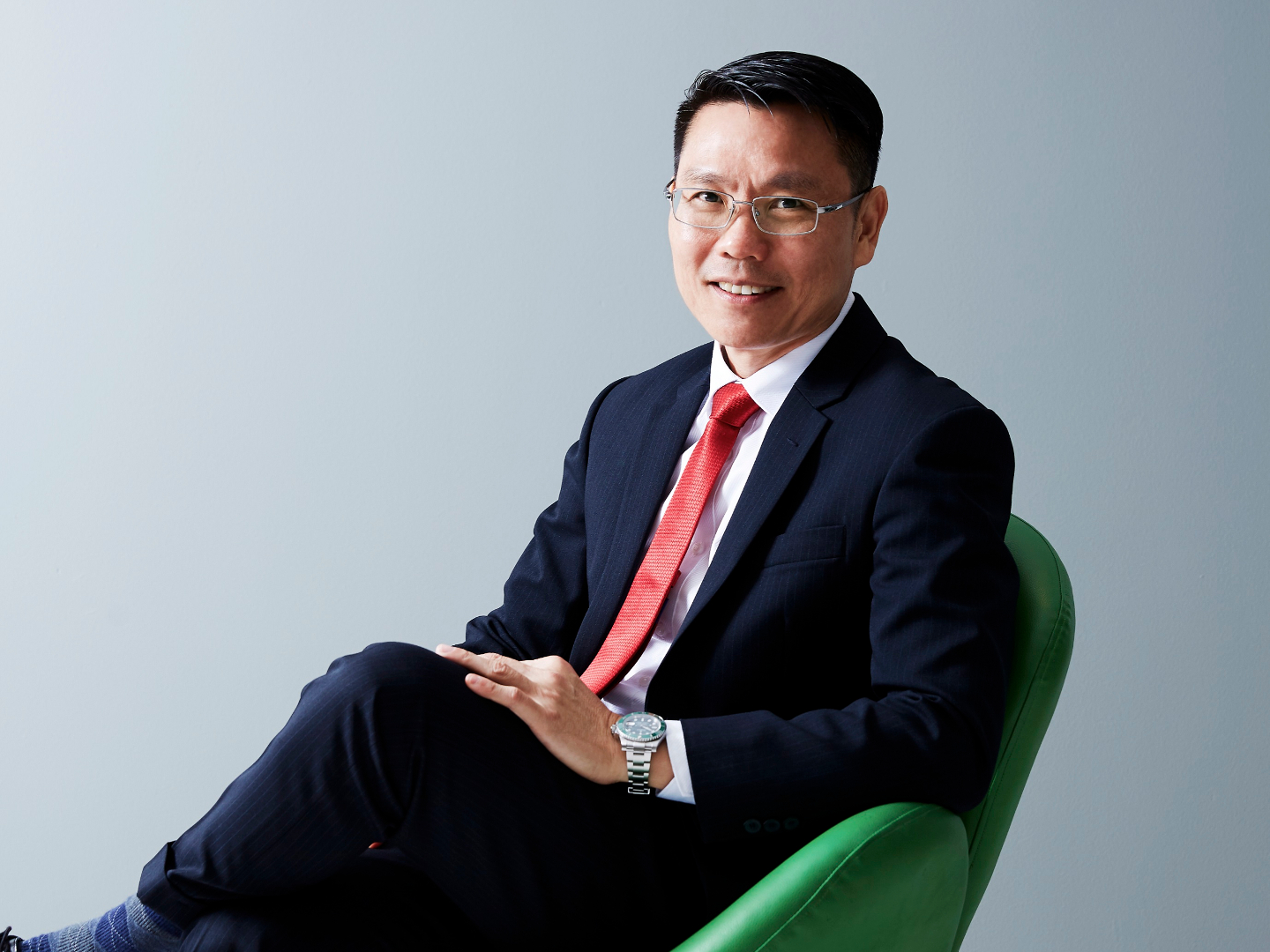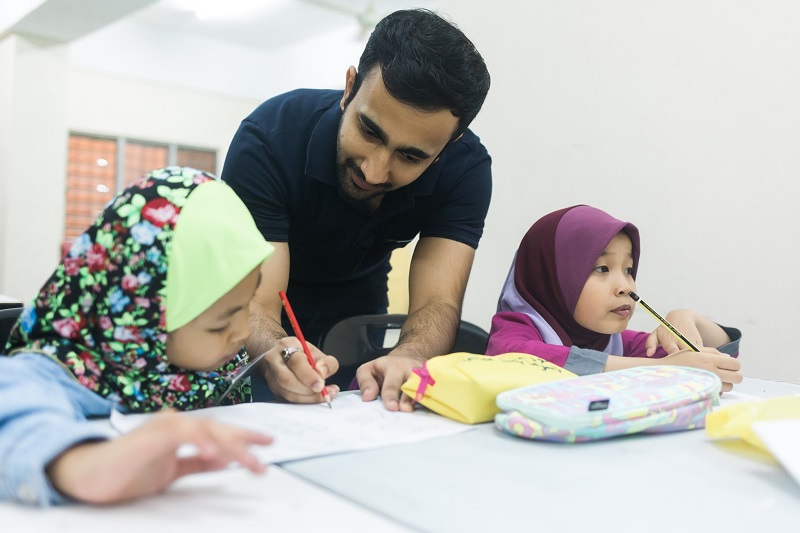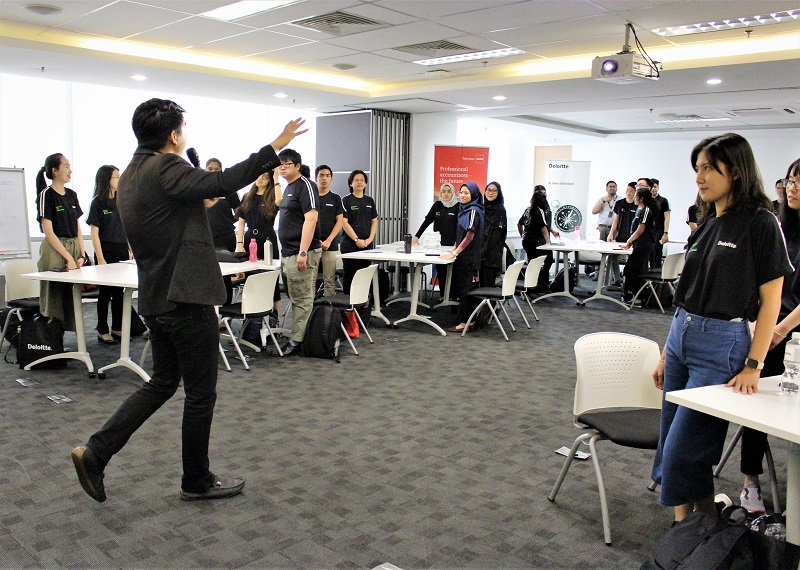
This is Yee's second term as CEO at Deloitte Malaysia (Photo: Soophye)
Deloitte is the largest professional services network by revenue and number of executives in the world, and CEO for Malaysia Yee Wing Peng feels that with great success comes greater responsibility. A proud Malaysian and loyal employee with more than 25 years under his belt at Deloitte, Yee has committed a commendable amount of resources into company-run capacity-building programmes for primary schoolchildren right up to activities for post-graduate students.
Education is hardly a main thrust for a company like Deloitte, but in its search for the best possible staff force, it must after all be committed to creating it. “We have five major business pillars — the conventional pillar of audit and tax, and what’s in high demand is consultancy, financial advisory and risk advisory. We have presence in more than 150 countries, a staff strength of 345,000 and our revenue for the year has already crossed US$50 billion,” he begins.
In his management of Deloitte, which next year celebrates 55 years of doing business in Malaysia, Yee has paid special attention to shoring up the local talent pool as part of the company’s contribution to nation-building efforts. A successful country with a vibrant economy is built on its people, and this is something he has always instinctively understood and is intent on not letting his influence go to waste.
“This is my second term as CEO, starting June 1 — each term is four years, just like the US president,” he grins good-naturedly. “In my first term, I put in the building blocks for the capacity-building initiative. Now I want to take it to the next level.
deloitte.jpg

“What I’ve done is create a very comprehensive and structured talent development agenda for the country. It starts from primary school to post-graduate level. Traditionally, the focus of capacity-building efforts is on under- and postgraduate students, and this applies to a lot of firms in the industry. I think it should be the case right from the beginning. It is part of Deloitte’s CSR (corporate social responsibility) programme, whereby we aim to impact 100 million people globally by 2030 — the number allocated to Malaysia is 245,000.”
Through Deloitte’s WorldClass initiative, staff apply their core skills, experience and global reach to empower more people in underserved communities through education, skills development, and access to opportunity. This happens by way of collaborations with businesses, government and educators to help transform learning and enable individuals to access the skills they really need to meet future job demands.
But why start from the primary level? That is where the wisdom of Yee’s foresight comes in. “When I looked at a household income survey that we did, the statistics quite clearly indicated the gap between the B40 and T20. And you will be surprised at this, but if the gross income of a family is no more than RM4,850 per month, they are categorised as B40. Which means that even if one family member can get a degree, become successful and earn a good salary, he or she can immediately elevate the family from B40 to M40. Getting as many people as possible to M40 — that is my goal.”
A Malaysian flagship CSR programme, Deloitte KidsEdu started in June 2019 with the aim of improving the academic performance of children in English, Mathematics and Science, targeting B40 students aged between seven and 12. Initially reaching out to two areas in Kuala Lumpur and Selangor, this easily scalable initiative has now also been implemented in Sarawak, Johor, Penang and Negeri Sembilan, with further plans to reach communities in Melaka, Perak and Pahang. With the onset of the pandemic, Deloitte KidsEdu pivoted to virtual classes from July 2020, just as staff did during working hours.
deloitte_kidsedu.jpg

Since then, bi-weekly English classes have been held every Monday to Wednesday evening, facilitated by Deloitte professionals volunteering their personal time as tutors. A total of 130 volunteers have served nearly 900 volunteer hours, with the programme having made an impact on 1,700 students nationwide so far.
If it takes a village to raise a child, it must also require a village to educate one. Since the inception of the programme, Deloitte has roped in a number of collaborators such as the Ministry of Education, Yayasan Munarah, Yayasan JCorp, YTL Foundation, MyPJ and community leaders who can better advise on the kind of support the children need at a given time.
“During the pandemic, we wanted the classes to go on; so, we gave the children some tablets and worked with YTL Foundation to supply them with high-speed internet. But as the programme grew, we came up with a different plan. You see, it’s a Deloitte policy to refresh laptops every two to three years, and we have 2,500 staff. Instead of giving the computers back to our leasor, we struck a deal with them so we could buy back the machines and donate them to the students. We also reached out to pupils from Monash University Malaysia and TAR College to help us refurbish these laptops so they are fit to be used again,” he says. Since June 2020, a total of 220 refurbished laptops and notebooks have been distributed to KidsEdu students nationwide, and the company is committed to providing 200 refurbished units annually.
The emphasis for secondary school students is a little different, focusing on sound financial knowledge that will see them through adulthood. Since 2018, Deloitte has been working with The Edge Foundation to address the growing concerns about debt, insolvency and unemployment among young Malaysians. Run since 2018, its Money & Me financial literacy programme for Form 4 students also teaches basic entrepreneurship skills to youth in Kuala Lumpur, Selangor, Kota Kinabalu and Negeri Sembilan. The initiative is two-pronged — equip young people with financial literacy as a basic life skill and provide low- and lower-middle income youths with basic entrepreneurship skills to help them improve their economic prospects, in particular by setting up small businesses.
At universities, the company ups the game with the Deloitte Tax Challenge and Deloitte Audit Challenge, open to students since 2008 and 2019 respectively. “The main purpose is to give them a taste of what is required in the profession,” Yee explains. “To date, we have had around 30,000 students from over 60 universities taking part in both challenges. Some years ago, I took the Deloitte Tax Challenge to the Southeast Asian level, so it has become a regional competition.”
Deloitte also runs a well-subscribed scholarship programme, but it is awarded based on need — children of single parents or whose mums and dads have retired, for example — and not necessarily academic merit. Yee says: “We have given scholarships to 11 people and, owing to their backgrounds, they are hungry for success and have done very well.”
Building talent is one thing, but retaining it is another. How does Deloitte, known for its stringent interview process, keep the good people that they hire? The answer is career growth within the company and access to international assignments and learning opportunities that only a organisation with its worldwide network can provide.
deloitte_tax_challenge.jpg

“During the implementation of GST (Goods and Services Tax) in Malaysia, we had no expertise in the field. So, many specialists came from other countries, which helped us build up the local talent pool in this subject. After the implementation here was complete, some countries in the Middle East started implementing GST, although they call it VAT (Value Added Tax). We were then in the position to send our guys to the Middle East to help them. The same applies to other disciplines in Deloitte; we want to build up local talent, with the opportunity to go overseas with their expertise. We can export expertise! In time, they will step up and play even a regional role, so there’s a lot of chance for career growth. It’s not just [about] domestic responsibilities but regional work as well.
“To keep good talent, to retain them — [we need to] share with them the reality that being here has its perks! We have such unique strengths that make us competitive in the global arena; if everyone leaves, there is nothing left to showcase. This is our home and we can all make it better — this is the message. Covid-19 changed a lot of things. People I know whose children are educated overseas and working there now want them to return home. What I am saying is that home has always been a great place with so many opportunities.”
To the young talents who decide to join Deloitte, Yee says: “Dig your heels in and prepare to put in the work, because the trust it requires to do the job of a professional consultant is not earned overnight.” This attitude is what has kept him at Deloitte for so long — so he is very much walking the talk with this one.
“In our profession, like many others, there will be people who think it is time to move on after three to four years. In fact, in a pre-pandemic survey, we asked the younger staff how long they should stay in a particular position — the consensus was three years. This means that from the time you graduate to retirement, you’d have changed jobs 10 times. What can you acquire this way? To excel, you need to pile in deep, and that requires you to do the same things many times over and refine at each go. Especially in this profession — trust is paramount and gained over many decades, through the experience and exposure that you have.”
Yee, who was born and raised in Kota Tinggi, Johor, was inspired to be an accountant because there was only one other person doing this sort of work in his hometown. His plan was to eventually take over this sole accountant’s job, but like many others of his age, he left for KL in search of a way to make a bigger impact. This, he argues, is still preferable to the many young people he sees finding work in neighbouring Singapore, as Kota Tinggi is quite close to the border.
“Over the years, I have had a lot of chances to work overseas, but I’ve chosen to stay here because I think there are a lot of opportunities in this country. Also, I love Malaysia deeply and I really hope to be able to contribute to our economy. I do a lot of talent engagement and I make it a point to encourage our youth as this country has a lot to offer. I hate to see so many of our youngsters living so far away from their families to seek a living when there are so many possibilities here. After all, this country is ours to make better.”
This father of three may get his perspective from personal experience — he is about to become an empty nester as the last of his three kids goes abroad to complete their studies, but he is already looking forward to the day they all return home.
Apparently, a strict schedule of thrice-weekly badminton games is what keeps him so trim, although we are convinced that his passion for the job is why he looks so much younger than his 53 years. “Fighting spirit is something important badminton teaches you,” he muses. “A competitive nature and how you emotionally adjust to pressure, sportsmanship, operating under pressure and working in a team.”
It could be said that Yee’s approach to life and work is a little old-fashioned, but we see this as a good thing. There is much to be said about traditional values like hard work, putting in long-term effort to see results and opting to stay in Malaysia and give back to the nation, even if it might be considered the “safe” choice. It is about investing in a future he wants to see — for Deloitte, Malaysia and himself.
This article first appeared on Aug 15, 2022 in The Edge Malaysia.


